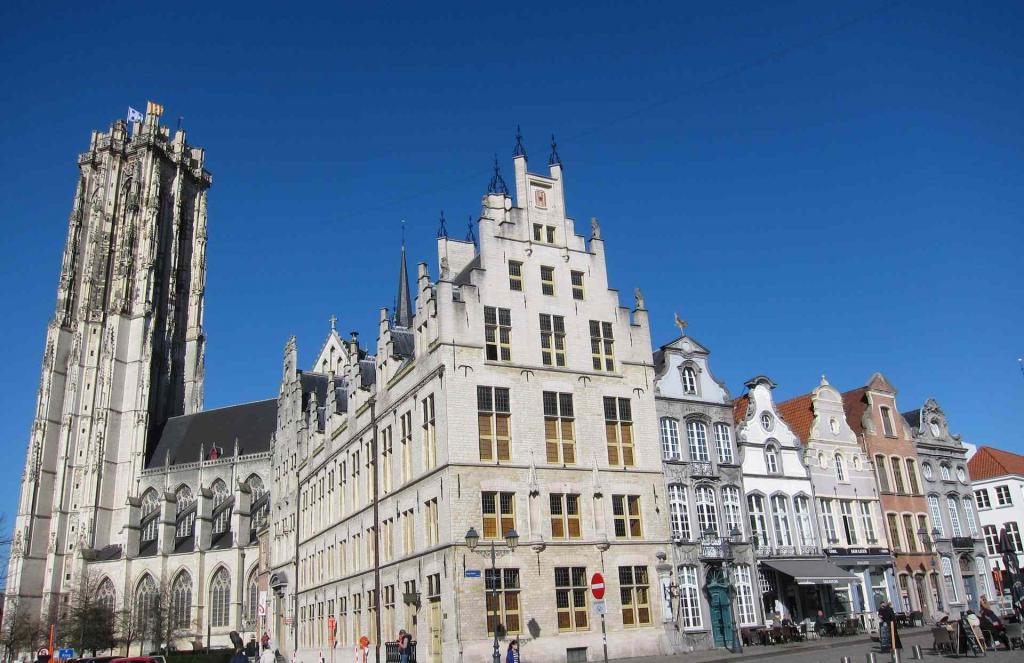Thessaloniki gets ready for its metro launch in November
The underground rapid transit lines have been under construction for almost two decades due to various project delays
 TheMayor.EU logo
TheMayor.EU logo 
A view of City Hall and Saint Rumbold's Cathedral, from Market Square in Mechelen, Source: Frank / Unspalsh
The project is backed by Greenpeace
This week, Greenpeace announced they will support an initiative to create an ‘Edible City’ in Mechelen, Belgium. The initiative started in 2021 and was originally launched by four climate organisations: Velt, Klimaan, Citamine and Natuurpunt, as well as the Funky Jungle restaurant.
The so-called Groene Voeten (Green Feet) project proposed greening a small area next to Saint Rumbold's Cathedral (Sint-Romboutskathedraal) in central Mechelen. However, instead of just planting trees, the group proposed that the church greenspace should also host fruit trees like berries, grapes and apples, as well as herbs.
The idea here is to transform the space from an uninteresting square which pedestrians pass through daily into a vibrant public space with street furniture and gardens, where both people and restaurants can come and pick produce that can later go into kitchens.
This would shorten the distance between food growth and consumption – a big part of the fight to make cities more sustainable. Reducing the gap between these two points would allow for more biodiversity and less carbon-intensive access to fresh produce.
Additionally, it could help regenerate local fauna, as many insects, small mammals, and birds can find a home and sustenance between the herbs and fruit trees.
In 2022, the Flemish government had to pay a fine of 850,000 euros to Greenpeace for failing its air pollution reduction plans. According to the VRT, the funds that Greenpeace is investing in Mechelen come from that pot (25,000 euros).
Additionally, the local council in the city has also decided to take part in the Edible City project and funded the idea with 150,000 euros.
Alderman of Nature and Green Development, Patrick Princen, was quoted by the VRT explaining that local authorities want to take out the cobblestones and much of the hedges that are already there. Moreover, the area would benefit greatly from rain capture, but the redevelopment will need to try and protect as much of the trees already present.

The underground rapid transit lines have been under construction for almost two decades due to various project delays

Now you can get your wine in Talence by paying directly in Bitcoin

That’s because the state has to spend money on updating the railway infrastructure rather than subsidizing the cost of the popular pass

Rethinking renewable energy sources for the urban landscape

The examples, compiled by Beyond Fossil Fuels, can inform and inspire communities and entrepreneurs that still feel trepidation at the prospect of energy transition

Now you can get your wine in Talence by paying directly in Bitcoin

The 10th European Conference on Sustainable Cities and Towns (ESCT) sets the stage for stronger cooperation between the EU, national and local level to fast track Europe's transition to climate neutrality.

At least, that’s the promise made by the mayor of Paris, Anne Hidalgo

The underground rapid transit lines have been under construction for almost two decades due to various project delays

At least, that’s the promise made by the mayor of Paris, Anne Hidalgo

Hostal de Pinós is located in the geographical centre of the autonomous region

Despite its church-y name, the district has long been known as the hangout spot for the artsy crowds

Urban dwellers across the EU are having a say in making their surroundings friendlier to people and the environment.

Forests in the EU can help green the European construction industry and bolster a continent-wide push for architectural improvements.

Apply by 10 November and do your part for the transformation of European public spaces

An interview with the Mayor of a Polish city that seeks to reinvent itself

An interview with the newly elected ICLEI President and Mayor of Malmö

A conversation with the Mayor of Lisbon about the spirit and dimensions of innovation present in the Portuguese capital














